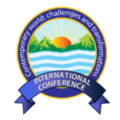
Prof. Dr. Zafar Iqbal
Dean / Professor of Media Studies
Faculty of Social Sciences
International Islamic University, Islamabad, Pakistan
Short Bio: Zafar Iqbal, Ph.D., has over 27 years of teaching and research experience. He received a doctorate in mass communication specializing in media and government relations in 2003. He served in several public sector universities and has also served in Civil Service for over six years, wherein his main responsibilities included editing a journal of international repute, training and also worked in an intelligence setup. Dr. Iqbal completed his post-doctorate at the University of Surrey, UK and produced three research publications under the mentorship of Professor Colin B. Grant on the area of mediated construction of Islamophobia. As a Chevening Fellow, he has been a resident scholar at the University of Oxford for six months, where he worked on his monograph on Islamophobia: Histories, Context and Deconstruction. Dr. Iqbal has collaborated in several research projects, authoring two books and two book chapters and over 28 research publications in reputable overseas and Pakistani journals. Dr. Iqbal has been quite active in spearheading research-based assignments of national and international organizations including United States Institute Peace.
Keynote Topic: Mass Media in Pakistan: Challenges and Opportunities
Contemporarily, media are not mere technological institutions; they are fourth pillar of any democratic society, cultural industries, weapons of mass deception, sources to promote and create national integrity, cohesion and cultural hybridity; besides they are the first line of defence against enemies in hybrid and 5th generation warfare. Nonetheless, significance of mass media’s traditional roles like surveillance of government and elite structures, transmission of mass culture, production of educated and informed citizenry, and a liaison between the state and masses can hardly be overemphasized in the current social media dominated environment. Rather, emergence of new technological tools like social media has constructed a ‘real global village’, which once envisaged and visualized by Marshal McLuhan in 1960s. At the same time, it has also necessitated to view the media and its power in a rather different way and reposed the governments a responsibility to use its unleashed power for their benefits, else they could prove to be the enemy’s tools within our system and can play havoc.
